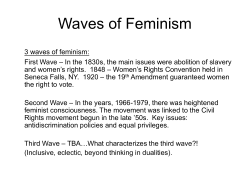
Feminist Therapy Chapter 12
Feminist Therapy Chapter 12 Introduction Feminist therapy puts gender and power at the core of the therapeutic process. It is built on the premise that it is essential to consider the social and cultural context that contributes to a person’s problems in order to understand that person. A central concept in feminist therapy is the psychological oppression of women and the constraints imposed by the sociopolitical status to which women have been relegated. History and Development Feminist therapy has developed in a grassroots manner, responding to challenges and to the emerging needs of women. No single individual can be identified as the founder of this approach, and its history is relatively brief. Feminist therapy can be traced to the women’s movement of the 1960’s, a time when women began uniting their voices to express their dissatisfaction with the limiting and confining nature of traditional female roles. A profusion of research on gender bias emerged in the 1970’s, which helped further feminist therapy ideas, and organizations began to foster the development of feminist therapy. Association for Women in Psychology (AWP) American Psychological Association (APA) The 1980’s, were marked by efforts to define feminist therapy as an entity in its own right, and individual therapy was the most frequently practiced form of feminist therapy work on the different voice of women and the morality of care and the work of Miller and the Stone Center scholars on the self-in-relation model of women’s development were influential in the development of a feminist personality theory. This changed dramatically and became more diverse as it focused increasingly on specific problems and issues such as body image, abusive relationships, eating disorders, and incest and sexual abuse, and the feminist philosophies that guided the practice of therapy also became more diverse. Four Enduring Feminist Philosophies Described as the second wave of feminism Liberal feminists focus on helping individual women overcome the limits and constraints of their socialization patterns. Cultural feminists believe oppression stems from society’s devaluation of women’s strengths. Radical feminists focus on the oppression of women that is embedded in patriarchy and seek to change society through activism. Socialist feminists share with radical feminists the goal of societal change. The third wave of feminism embraces diversity with its inclusion of women of color, lesbians, and the postmodern and constructivist viewpoints espoused by many in the most recent generation of women. Postmodern feminists provide a model for critiquing the value of other traditional and feminist approaches, addressing the issue of what constitutes reality and proposing multiple truths as opposed to a single truth. Women of color feminists believe it is essential that feminist theory be broadened and made more inclusive. Lesbian feminists share commonalities with many aspects of radical feminism. Global-international feminists take a worldwide perspective and seek to understand the ways in which racism, sexism, economics, and classism affect women in different countries. It is clear that there is no single, unified feminist theory. Feminist therapists believe gender is central to therapeutic practice, that understanding a client’s problems requires adopting a sociocultural perspective, and that empowerment of the individual and societal changes are crucial goals in therapy. Key Concepts Six Characteristics of traditional theories that reflect outdated assumptions about the role gender plays in behavior: Androcentric theory -uses male orientated constructs to draw conclusions about human nature Gendercentric theories -propose two separate paths of development for women and men. Ethnocentric theories -assume that the facts pertaining to human development and interaction are similar across races, cultures, and nations. Heterosexist theories -view a heterosexual orientation as normative and desirable and devalues same-sex relationships. Intrapsychic orientation -attributes behavior to intrapsychic causes, which often results in blaming the victim. Determinism -assumes that present personality patterns and behavior are fixed at an early stage of development. Gender-fair theories- explain differences in the behavior of women and men in terms of socialization processes rather than on the basis of our “true” natures. Flexible-multicultural theory-uses concepts and strategies that apply equally to both individuals and groups regardless of age, race, culture, gender, ability, class, or sexual orientation. Interactionist theories-contain concepts sepcific to the thinking, feeling, and behaving dimensions of human experience and account for contextual and environmental factors. Life-span perspective- assumes that human development is a lifelong process and that personality patterns and behavioral changes can occur at any time rather than being fixed during early childhood. Feminist Perspective on Personality Development Feminist therapists emphasize that societal gender-role expectations profoundly influence a person’s identity from the moment of birth and become deeply ingrained in adult personality. Girls play with dolls, boys play with trucks Psychological differences between men and women are due to the fact that women are the primary caretakers who raise the kids By identifying with mothers who sacrifice their own desires and goals to serve the family, girls reduce their capacity for autonomy and independence. Boys model the aggressive, power-seeking nature of adult males and thus reduce their capacity for the expression of empathy and certain emotions. A woman’s sense of identity and self-concept develop in the context of relationships. Many of the techniques of feminist therapy foster mutuality, relational capacities, and growth in connection. Gender schema theory provides another perspective on the development of women…the gender schema is an organized set of mental associations people use to interpret what they see. Engendered lives are used to describe beliefs that the gender is the organizing principle in people’s lives. Feminist therapists teach their clients that uncritical acceptance of traditional roles can greatly restrict their range of freedom to define the kind of person they want to be. They can also experience mutual behavioral characteristics such as accepting themselves as being both dependent and independent at different times, being interdependent, giving to others and being open to receiving, thinking, feeling, and being tender and tough. Principles of Feminist Psychology A number of feminist writers have articulated core principles that form the foundation for the practice of feminist therapy. These principles are interrelated and have a great deal of overlap. The principles are: The personal is political Personal and social identities are interdependent Definitions of distress and “mental illness” are reformulated Feminist therapists use an integrated analysis of oppression The counseling relationship is egalitarian Women’s perspectives are valued The Therapeutic Process Therapeutic Goals: 5 goals for feminist therapy have been proposed-equality, balancing independence and interdependence, empowerment, self-nurturance, and valuing diversity. The ultimate goal of feminist therapy is to create the kind of society where sexism and other forms of discrimination and oppression are no longer a reality. The therapist strives for transformation, for both the client and society as a whole. Individual level: is to help women and men recognize, claim, and embrace their personal power. Through the empowerment, clients are able to free themselves from the constraints of their gender-role socialization and to challenge ongoing institutional oppression. Feminist therapists help clients to depathologize women’s experiencing and to change society so that women’s voices are honored and women’s relational qualities are valued. Therapist’s Function and Role Therapists use gender and power analyses to understand clients and their concerns, and they are committed to monitoring their own biases and distortions, especially the social and cultural dimensions of women’s experiences. Feminists share common ground with existential therapists who emphasize therapy as a shared journey. Also share beliefs with person-centered therapists such as trusting the client’s ability to move forward in a positive and constructive manner. Also believe the process should be nonhierarchical, person-toperson relationship, and aim to empower clients to live according to their own values and to rely on an internal locus of control in determining what is right for them. Client’s Experience in Therapy Clients are active participants in the therapeutic process. Therapists are committed to ensuring that this doesn’t become another arena in which women remain passive and dependent. It is important to give voice to their experiencing. Clients realize they are really understood, they begin to get in tough with a range of feelings including anger, and other “prohibited” emotions that they may have learned to deny themselves. Therapists do not restrict their practice to women clients; they also work with men, couples, families, and children. The therapeutic relationship is a partnership, and the client will be the expert in determining what he needs and wants from therapy. Major goal: is empowerment, which requires a sense of selfacceptance, self-confidence, joy and authenticity. Relationship Between Therapist and Client The structure of the client-therapist relationship models how to identify and use power responsibility. Therapists clearly state their values to reduce the chance of value imposition. First: are acutely sensitive to ways they might abuse their own power in the relationship, such as by diagnosing unnecessarily, by interpreting or giving advice, by staying aloof behind and “expert” role, or by discounting the impact the power imbalance between therapist and client has on the relationship. Second: therapists actively focus on the power clients have in the therapeutic relationship. Third: feminist therapists work to demystify the counseling relationship. Application: Therapeutic Techniques and Procedures Many feminist therapists do not use diagnostic labels, or they use them reluctantly. Feminist therapists believe diagnostic labels are severely limiting for these reasons: They focus on the individual’s symptoms and not the social factors that cause dysfunctional behavior May represent an instrument of oppression They may reinforce gender-role stereotypes and encourage adjustment to the norms of status quo May reflect the inappropriate application of power in the therapeutic relationship Can lead to an overemphasis on individual solutions rather than social change Have the potential to reduce one’s respect for clients Feminist therapists believe women have many more reasons to experience depression than men, and they often frame depression as a normative experience for women. Women are often financially disadvantaged or dependent, relationally submissive, and strive to please others by anticipating their needs. Depression may result from women’s internalized perception, belief, and experience of not being in control of their lives or bodies and feeling less valuable than men. An alternative form of assessment preferred by feminist therapists is gender-role analysis, which involves a cooperative exploration by client and therapist of the impact of gender on the client’s distress. Techniques and Strategies Feminist therapists have developed several techniques; particularly important are consciousness-raising techniques that help women differentiate between what they have been taught is socially acceptable of desirable and what is actually healthy for them. Techniques include: Empowerment: getting the most from each session, clear expectations, identifying goals, and working toward a contract that will guide the process Self-disclosure: is not just sharing information and experiences. Also involves a certain quality of presence the therapist brings to the sessions Gender-role Analysis: explores the impact of expectations on the client’s well being or distress and draws upon this information to make decision about future gender-role behaviors. Gender-role Intervention: placing it in context of society’s role expectations for women. The aim is to provide insight into the ways that social issues are affecting the problem. Power Analysis and Power Intervention: becoming aware of the power difference between men and women in society and empowering to take charge of ones self and life. Also includes recognizing different kinds of power that clients possess or to which they have access. Bibliotherapy: Books that address the consequences of society’s obsession with certain issues. Can explore and enhance therapy by reactions to what they are reading. Assertiveness Training: Become aware of their interpersonal rights, transcend stereotypical gender roles, change negative beliefs, and implement changes in their daily lives. Reframing and Relabeling: Reframing implies a shift from “blaming the victim” to a consideration of social factors in the environment that contribute to a client’s problem. Relabeling is an intervention that changes the label or evaluation applied to some behavioral characteristic. Group Work: Group work alone is often the preferred modality for some issues that women experience in out culture. Self help groups and advocacy groups help women experience their connectedness and unity with other women. Social Action: Participation in activities can empower clients and help them see the link between their personal experiences and the sociopolictal context in which they live. The Role of Men in Feminist Therapy Men can be nonsexist therapists Men can be pro-feminist therapists when they embrace the principles and incorporate the practices of feminism in their work. This entails being willing to confront sexist behavior in themselves and others, redefining masculinity and femininity according to other than traditional values, working toward establishing egalitarian relationships, and actively supporting women’s efforts to create a just society. Feminist Therapy from a Multicultural Perspective Feminist therapists suggest that multicultural counseling refers to the analysis of social structures affecting mental health, including sexism, racism, and other levels of both oppression and privilege. The use of power in relationships has application for understanding power inequities due to racial and cultural factors. Culturally competent feminist therapists look for ways to work within the client’s culture by exploring consequences and alternatives. They appreciate the complexities involved in changing within one’s culture but do not view culture as sacrosanct. Limitations for Multicultural Counseling The therapists job is not to take away any of the pain or struggle, nor to choose for the client, but to be present in such a way that the client will truly be empowered to decide for him/herself. The core value of equality in feminist therapy may limit the effectiveness of the therapist in working with clients from culturally different backgrounds. Summary and Evaluation Each of the eight basic philosophies underlying feminist practice-liberal, cultural, radical, socialist, postmodernist, women of color, lesbian, and global-international-has a different view on the sources of oppression and what is needed to bring about substantial social transformation. Feminist share a number of basic assumptions and roles: they engage in appropriate self-disclosure; they make their values and beliefs explicit so that the therapy process is clearly understood; they establish egalitarian roles with clients; they work toward client empowerment; and they emphasize the commonalities among women while honoring their diverse life experiences. Contributions of Feminist Therapy They are paving the way for gender-sensitive practice and an awareness of the impact of the cultural context and multiple oppressions. With a feminist orientation understand how important it is to become fully aware of typical gender-role messages clients have grown up with, and they are skilled in helping clients identify and challenge these messages. The proper focus of therapy includes working to change oppressive factors in society rather than expecting individuals to merely adapt to expected role behaviors. Feminist therapy principles have been applied to supervision, teaching, consultation, ethics, research, and theory building as well as to the practice of psychotherapy. Gestalt therapy and feminist therapy share the goal of increasing the client’s awareness of personal power. Cognitive behavioral therapies and feminist therapy are compatible in that they view the therapeutic relationship as a collaboration and the client as being in charge of setting goals and selecting strategies for change. Feminist therapy suggests that a counseling theory should be gender-fair, flexible-multicultural, interactionist, and life-spanorientated. A feminist therapy approach can contribute to broadening the theoretical base of other therapy models as well as enriching all of our lives by encouraging positive social activism in our communities and throughout the world. Limitations and Criticisms of Feminist Therapy Feminist therapists do not take a neutral stance. They advocate definite change in the social structure, especially in the area of equality, power in relationships, the right to self-determination, freedom to pursue a career outside the home, and the right to an education. Feminist therapists should challenge clients’ unexamined choices, but most contemporary feminists honor clients’ choices as long as those choices are indeed informed ones. Feminist therapists need to be cautious to avoid imposing their values on their clients, even in subtle ways. Some disagreement as to whether feminist therapy is a philosophical orientation or a theory. Feminist therapy was developed by White, middle-class, heterosexual women. In the 1980’s they acknowledged that they had overlooked women of color and assumed that rave was nto as crucial as gender in understanding oppression.
© Copyright 2025












